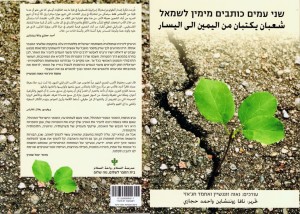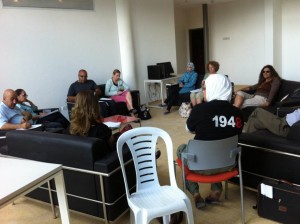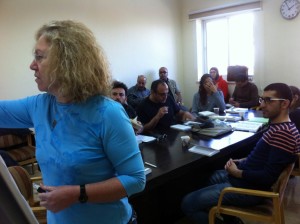Program for Palestinian and Israeli Literature Teachers: 11-month summary report
The following is a summary report of an 11 month program for Israeli and Palestinian literature teachers, funded by a Dutch Foundation and run from March 2014 to January 2015. This summary integrates the first report to give a complete picture of the program. We are pleased to say that the report reflects the impact this course has had.
Course Overview
“Creating Change Advocates: Palestinian & Israeli Professionals in Dialogue and Action” consisted of 100 hours of training for literature teachers. The target group consisted of 20 literature teachers (10 Palestinians from Palestine and 10 Israelis). The course consisted of 2 main components, as outlined below, and took place over 11 months. It was conducted by the School for Peace (SFP) in cooperation with Tawasul, a non-profit organization in Palestine. Half way through the course a war broke out in Gaza, and its effects on the course are also outlined below.
Course Objective
The SFP have developed an anthology of Israeli and Palestinian literature: “Two Peoples Write from Right to Left”. The anthology includes 34 poems and 27 short stories from the most important Israeli and Palestinian poets and authors. All the poems and short stories appear in both languages. The anthology also includes four introductions, written by literature experts, on Israeli and Palestinian poetry and prose in both languages. This is an excellent tool to enable teachers to introduce their students to the life of the ‘other’ and to build tolerance, acceptance and respect for the culture of the ‘other’.
The program engaged teachers in critical thinking and self-analysis, regarding their role in affecting change and the education provided by their schools. Through these courses SFP & Tawasul empowered teachers to become active in the peace process, shifting society towards humanizing the ‘other’, and advancing peace. Having participated in the program, the teachers now have the tools to educate their students so that they too will be more informed and develop a more balanced perspective and understanding of the ‘other’.
Today, teachers lack the know-how to adequately educate students about the conflict and related issues, which leads to racism, misconceptions and disinformation. Students, on both sides, are not exposed to literature of the ‘other’. Teachers who participated in this program met and worked with their colleagues from the ‘other side’, and were exposed to alternative views of the conflict. By experiencing different narratives they began to change their attitudes towards past and current events, and their understanding of the situation broadened. In addition to gaining a new perspective, teachers gained new skills and materials to initiate change in their schools. The program was designed to channel teachers’ newfound awareness into positive action, to educate children in the classroom to think and act differently from the norm and take responsibility for working towards equality and peace.
Report
We would like to share with you this detailed report on the change agents course for Palestinian and Israeli literature teachers.
In November 2013 we wrote the program for the course together with Tawasul and started disseminating it. In light of the difficult situation between Israel and Palestine, this was not an easy task. We disseminated the program at a time when an Israeli teacher, named Adam Verta had been fired for questioning the morality of the army and occupation in his classroom. This scared many teachers and deterred them from engaging in questioning the morality of the occupation. Also, on the Palestinian side this was not an easy task as a dialogue between Israeli and Palestinian teachers may appear as normalization of the occupation, even though the goals of the project are the complete opposite. The goal of the program is to humanize the other while using literature in a creative and critical way. The program allowed the teachers to examine literature, both poems and prose, of the ‘other’ and use these writings to get acquainted with the ‘other’.
We sent the program to the supervisor of the education department to send out to the teachers they are responsible for. The program reached 1000s. We interviewed 14 teachers from Israel and 10 in Palestine. From the those interviewed, 10 were accepted from Israel, and 6 from Palestine. Among the Israelis (a group made up of three men and seven women) there is one Palestinian citizen of Israel. Three of the Israeli participants hold a doctorate in literature, two are teacher trainers, and the rest teach literature in high schools. The Palestinian group participants are younger and all of them teach literature. When the course began, four more participants joined, among them a high school principal and a man from the Palestinian Ministry of Education in the Palestinian Government.
The course began on March 20th 2014 at Neve Shalom – Wahat al-Salam.
Literature Teachers Course Begins
On March 20th we started this monthly course, run with the Ramallah-based NGO Tawasul, for Palestinian and Israeli literature teachers. The goal of the project was to train teachers to teach the literature of the other, thus humanizing the ‘other’ through literature, in a creative and critical process. We opened the course with a three-day intensive seminar designed to introduce the Palestinians and Israelis to each other and to each other’s narratives.
The participants had an intensive dialogue on daily life under occupation. The participants listened intently to each other and spent a long time talking informally in the evenings. On the third day, Friday evening, we heard that three young people from Jenin had been killed by the Israeli army. One of the group participants had known one of the people killed and the whole group felt very sad; they also felt that it is important to continue to fight this cruel reality and that they have a role to work with their students to help them understand the other and the reality they live in.
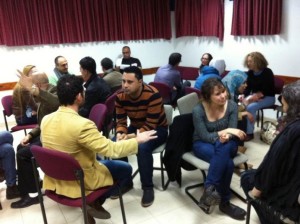 Over the next 10 months of the course, the teachers examined national and ethnic identity, and issues related to the conflict, through the works of key writers and poets of both peoples. They were provided with an anthology published by the SFP (Two People Write from Right to Left) and were trained to teach the literature of the ‘other’ in their classrooms.
Over the next 10 months of the course, the teachers examined national and ethnic identity, and issues related to the conflict, through the works of key writers and poets of both peoples. They were provided with an anthology published by the SFP (Two People Write from Right to Left) and were trained to teach the literature of the ‘other’ in their classrooms.
Further Meetings
The second meeting took place at a Hotel Everest in Beit Jallah on May 9th 2014. At this point four new Palestinian participants joined the group; as mentioned above one works in the Palestinian Ministry of Education and the others as high school literature teachers. We continued the dialogue begun in the first meeting. After the dialogue we listened to a lecture by Dr. Esam Mouslat on Palestinian literature as it relates to the history of the conflict between the two peoples.
The third two-day meeting took place over the weekend of June 12th-13th 2014 at Wahat al-Salam – Neve Shalom. Obtaining permits for the Palestinian participants was fraught with constant struggles, and the state made no consideration of the importance of involving the Palestinian Ministry of Education in our meetings. After the help of Knesset Member Zahava Gal-On one of the participants received approval to come to Israel after being refused by the army for many years. The meeting opened with a reading, in Arabic, of the poem ‘The Dice Player’ by Mahmoud Darwish, which was translated into Hebrew by Dr. Maram Masarwi (a village member of Neve Shalom – Wahat al-Salam). We discussed the poem and its many meanings on life and death. One of the Palestinian participants suggested that we focus on the last section of the poem and we discussed it in depth. The Palestinian participants spoke about their connection to the Darwish’s poem and spoke about his life. Both the Jews and Palestinians connected to the rich content of the poem and there was great emotion in the group. The group asked to meet with the translator and the following morning we set up a fascinating conversation with Dr Masarwi on the poet Mahmoud Darwish and on the complex work of translation.
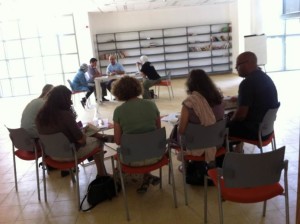 Later that day we moved on to a simulation in which a teacher prepared and presented a lesson to their national group, while the others watch and give feedback. Each group picked a piece of writing to teach in a simulated literature lesson. The Palestinians chose the story by Daa Hadar, ‘Sleep, Sleep, Esawiyya’, which can be found in our anthology, and a Palestinian participant taught the lesson to the Palestinian group. The Jews observed the fascinating lesson. The teaching was based on the work of Paulo Friere’s pedagogical dialogue and the “students” were asked to share their views from their life experiences under the military occupation. The Palestinian teacher gave an example of humanizing the ‘other’ (who, in this story, was an Israeli woman soldier) and helped the students see the complex character of the Israeli woman soldier. The main character in the story is a woman soldier who as part of her military service is observing the Palestinian neighbourhood of Esawiyya.
Later that day we moved on to a simulation in which a teacher prepared and presented a lesson to their national group, while the others watch and give feedback. Each group picked a piece of writing to teach in a simulated literature lesson. The Palestinians chose the story by Daa Hadar, ‘Sleep, Sleep, Esawiyya’, which can be found in our anthology, and a Palestinian participant taught the lesson to the Palestinian group. The Jews observed the fascinating lesson. The teaching was based on the work of Paulo Friere’s pedagogical dialogue and the “students” were asked to share their views from their life experiences under the military occupation. The Palestinian teacher gave an example of humanizing the ‘other’ (who, in this story, was an Israeli woman soldier) and helped the students see the complex character of the Israeli woman soldier. The main character in the story is a woman soldier who as part of her military service is observing the Palestinian neighbourhood of Esawiyya.
An Israeli participant then taught a lesson on Halil Joubran Halil’s ‘A Poem on Love and Marriage’ in the simulated Jewish class. She also brought two more poems on the same topic, written by Hebrew authors. The lesson was interesting and also very different from the lesson before. As before, the lesson was followed by a discussion. At the end the participants said that it was an instructive experience observing a teacher from the ‘other’ people, teaching one of ‘their’ poets or writers and succeeding to captivate the students and bring out the complexity of the writing. As the meeting came to its conclusion we decided not to hold a meeting during Ramadan and to meet again on September 5th, after the summer holiday. In the September meeting we would discuss the theme of refugees and migration in Israeli and Palestinian literature. We arranged for a panel of two lecturers followed by group discussion. We created a mailing list and between our joint meetings participants sent pieces of literature, articles, and their thoughts on current events to one another.
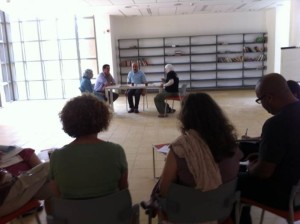 The teachers continued, despite the increasingly difficult situation. They feel that they have a mission and have already passed on some of the things they have learnt to their students. The teachers came from all over Israel and Palestine and the material that was shared was very interesting. The teachers are committed to the program despite worsening situations between Jews and Palestinians; they feel they have a mission with their students and started to teach in their classrooms the literature of the “other”.
The teachers continued, despite the increasingly difficult situation. They feel that they have a mission and have already passed on some of the things they have learnt to their students. The teachers came from all over Israel and Palestine and the material that was shared was very interesting. The teachers are committed to the program despite worsening situations between Jews and Palestinians; they feel they have a mission with their students and started to teach in their classrooms the literature of the “other”.
Mid-Course Feedback from Participants
R (a Jewish Israeli participant teaching in a teachers’ seminar):
The course is very interesting, and it is significant to meet the participants, Israelis and Palestinians and to understand the differences between us, and the ways we connect. It’s significant because it’s an opportunity to meet Palestinians face to face to share opinions, not to fight. There is a place where we can talk, agree and disagree.
It is the first time in my life meeting Palestinians from the West Bank, both young and old, who experience the occupation from the other side. It really moves me. The course has changed my political view. I was always against the occupation, and was on the radical left, but I was surprised by the way my opinions were transformed from thought to action, because meeting people is action. It’s a different thinking about the other side and actually meeting them. This experience has got me to think about what I can do, as a teacher. I am thinking of volunteering. I am more committed to act on my views.
T (a Palestinian participant, a teacher, researcher of literature, and author of books):
The best part [of the course] was the part, of presenting a lesson and receiving feedback from participants, because it is important to learn how to teach literature in the shadow of the conflict. This is especially important when we now have a method to do it which connects the student to the conflict via the literature, and at the same time give the students a certain distance. It was something that we can achieve in Wahat al-Salam – Neve Shalom. The most interesting thing that has come out of the discussions is how everybody from the two sides talks about the conflict; he or she can say how the conflict affects them. If we can understand how it is an individual level, we can see how it affects the whole society. It was very good to see both people discussing these issues, but also through this we come together as one group as one group and gain the tools to achieve peace in the future. Living together in Neve Shalom – Wahat al-Salam encouraged us to live together be it in one state or two states – The question is how can we transmit and increase these ideas to children and youth? For me as a teacher, and writer, it gives me more experience to deal with this kind of literature, and I hope to continue to develop this method in my work at school.
Summer of War
Mid-way through the course, from June to September, there was a bloody war that killed over 2000 Palestinians, of whom 431 were minors and 200 women. Throughout the war rockets and mortars killed two Israeli civilians and one foreign national in Israel. 64 soldiers were killed in Israel and Gaza. Even in the Palestinian Authority the IDF frequently entered cities and homes. Meanwhile, in Israel there was violence against protesters who opposed the war.
Originally we had planned to take a break over the month of Ramadan to respect those who were fasting. In fact, we had to stop activity for a while because of the war. We had to postpone a meeting in early September because the Palestinians said that, as long as people were being killed, we should not meet and we respected this request.
Restarting the Course
In October, we held a meeting in Beit Jallah, on the border of Israel and the West Bank. It was a great accomplishment that, despite the war, the Israeli and Palestinian participants were eager to come together and continue. This was a period of great hostility and fear between Jews and Arabs in Israel and between Palestinians and Israelis. The participants felt commitment to the group and the course and said it was important for them to continue. They saw the group as an island of sanity in such a difficult time. This workshop was devoted to the issue of refugees in Israeli and Palestinian literature. The group first heard two lectures.
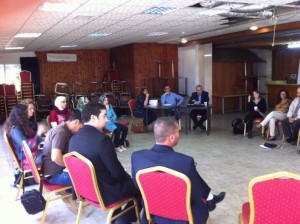 The first was by Professor Yigal Schwartz, the head of the Literature Department at Ben Gurion University and a member of Wahat al-Salam – Neve Shalom. Professor Schwartz spoke about the literary works of Aharon Appelfeld, and on refugees and alienation of the characters in his works. Participants asked many questions both during and after this interesting lecture. Then the participants heard a lecture by Tahsin Yakin – a publicist, literature writer and expert on the Palestinian literature – on refugees in Palestinian literature. This was also followed by a discussion. The next day we took part in a simulated literature lesson and it was amazing to see how literature could be used as a tool to connect people.
The first was by Professor Yigal Schwartz, the head of the Literature Department at Ben Gurion University and a member of Wahat al-Salam – Neve Shalom. Professor Schwartz spoke about the literary works of Aharon Appelfeld, and on refugees and alienation of the characters in his works. Participants asked many questions both during and after this interesting lecture. Then the participants heard a lecture by Tahsin Yakin – a publicist, literature writer and expert on the Palestinian literature – on refugees in Palestinian literature. This was also followed by a discussion. The next day we took part in a simulated literature lesson and it was amazing to see how literature could be used as a tool to connect people.
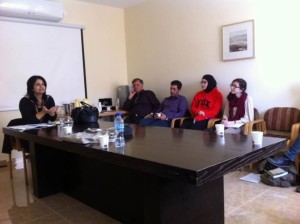 In November, we held another workshop at Beit Jallah, The topic was gender in Palestinian literature. The meeting started with a lecture by Professor Nidaa Khoury from Ben Gurion University (pictured right). The talk was about women in Palestinian literature, and Professor Khoury talked about three generations of women writers over the last hundred years. Following the lecture, an Israeli participant led the lesson (pictured below) in which we discussed a work by the writer Sahar Khalifeh, a short story about a woman’s actions in an environment that does not respect women rights. Following the lesson there was a very lively discussion about the themes of the work whether, and how, the story could be used to start a class discussion about the conflict and its socio-political effects.
In November, we held another workshop at Beit Jallah, The topic was gender in Palestinian literature. The meeting started with a lecture by Professor Nidaa Khoury from Ben Gurion University (pictured right). The talk was about women in Palestinian literature, and Professor Khoury talked about three generations of women writers over the last hundred years. Following the lecture, an Israeli participant led the lesson (pictured below) in which we discussed a work by the writer Sahar Khalifeh, a short story about a woman’s actions in an environment that does not respect women rights. Following the lesson there was a very lively discussion about the themes of the work whether, and how, the story could be used to start a class discussion about the conflict and its socio-political effects.
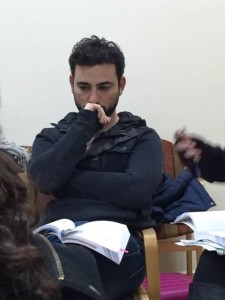 In January we held the last training session of the course. The meeting started with a lecture by Dr. Mimi Haskin, a literature expert on the Nakba in Israeli literature, and lecturer at the Kibbutzim College. Dr. Haskin presented examples of Israeli literature, which had been translated by Anwar Ben Badis. The lecture was very informative and led to many questions from the participants. Dr. Mimi Haskin referenced to three approaches to the Nakba in Israeli literature and brought samples of three generations of writers and poets. After the lecture, an Israeli participant led a simulated lesson for the Israeli participants, focusing on the poems of Ayman Kamal Aghbariya. The Israeli participants entered into the roles in the poems. In particular, the facilitators, could see that a Russian-born Israeli participant had really emotionally connected with one of Aghbariya’s poems. In the discussion that followed, the Palestinian participants expanded on the lesson by telling the rest of the group that the poet Aghbariya belongs to the same style that also included Rashid Hussein. The emotional connection that the Israeli participants had with the poem of a Palestinian poet and their ability to lead an interesting inter-cultural discussion was most touching.
In January we held the last training session of the course. The meeting started with a lecture by Dr. Mimi Haskin, a literature expert on the Nakba in Israeli literature, and lecturer at the Kibbutzim College. Dr. Haskin presented examples of Israeli literature, which had been translated by Anwar Ben Badis. The lecture was very informative and led to many questions from the participants. Dr. Mimi Haskin referenced to three approaches to the Nakba in Israeli literature and brought samples of three generations of writers and poets. After the lecture, an Israeli participant led a simulated lesson for the Israeli participants, focusing on the poems of Ayman Kamal Aghbariya. The Israeli participants entered into the roles in the poems. In particular, the facilitators, could see that a Russian-born Israeli participant had really emotionally connected with one of Aghbariya’s poems. In the discussion that followed, the Palestinian participants expanded on the lesson by telling the rest of the group that the poet Aghbariya belongs to the same style that also included Rashid Hussein. The emotional connection that the Israeli participants had with the poem of a Palestinian poet and their ability to lead an interesting inter-cultural discussion was most touching.
So was the feedback from the Palestinians, who were impressed by the humanity that was expressed.
After dinner both Jews and Arabs went walking in Beit Jallah, which had been decorated for Christmas. The next day the Palestinian participants took part in a simulated lesson. The Palestinian teacher leading the lesson made a courageous choice of the poem, “Call Up” by Meir Wieseltier, which deals with the dilemmas associated with conscripting young Israelis into the army.
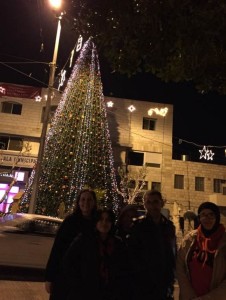 The poem criticizes the process and its impact on young people. The Israeli feedback on the simulated lesson was thankful, both for how the lesson had been conducted and the discussion about the army that followed. Everyone discussed the dilemma of how a teacher brings their (political) position into class discussions through their own interpretations. The facilitators circulated articles by Paulo Freire and Macedo on the issue, as well as two recently published articles on the subject of political values in education (in a book published by the Kibbutzim College of Education). These articles were: Mimi Haskin’s article on teaching literature and political thought in the classroom and Eyal Naveh’s article on the subject of political education. A discussion followed on whether it is possible for a teacher to be neutral in his role as an educator or should they share their values and points of view with the students. The SFP approach follows Friere in that the teacher should share his world view with the students and encourage the students to analyze it and develop their critical thinking abilities. At the same time the teacher should be aware of the difference between political education and indoctrination.
The poem criticizes the process and its impact on young people. The Israeli feedback on the simulated lesson was thankful, both for how the lesson had been conducted and the discussion about the army that followed. Everyone discussed the dilemma of how a teacher brings their (political) position into class discussions through their own interpretations. The facilitators circulated articles by Paulo Freire and Macedo on the issue, as well as two recently published articles on the subject of political values in education (in a book published by the Kibbutzim College of Education). These articles were: Mimi Haskin’s article on teaching literature and political thought in the classroom and Eyal Naveh’s article on the subject of political education. A discussion followed on whether it is possible for a teacher to be neutral in his role as an educator or should they share their values and points of view with the students. The SFP approach follows Friere in that the teacher should share his world view with the students and encourage the students to analyze it and develop their critical thinking abilities. At the same time the teacher should be aware of the difference between political education and indoctrination.
The participants raised the issue of the use of literature as propaganda by both sides. A Palestinian participant spoke about an anti-propaganda committee within the Palestinian Ministry of Education that he was involved with. He succeeded to change the use of the term the “Zionist enemy” in Palestinian textbooks to “Israeli occupation” – a change which was carried out in all textbooks in the education system of the Palestinian Authority.
Evaluation
After the last meeting the participants all completed evaluation questionnaires and below are the average results. The scale is 1-7:
- To what extent has the course contributed to your awareness of the conflict? – 6.2
- To what extent has the course added to your skills as a change agent through teaching the literature of the other? – 5.7
- To what extent has the course increased your commitment to changing the situation between Jews and Palestinians in Israel, and between Israel and Palestine? – 6.5
- Concerning the first experiential workshop:
a. How much did it add to your knowledge on the topic? – 6
b. To what extent was dialogue enabled? – 6.4 - How would you rate the lectures? – range between 5.5 – 6.5
- To what extent did group discussions contribute to:
a. critical analysis? – 6.2
b. a thorough understanding of the conflict? – 6.1
c. promoting dialogue between the two sides? – 6 - To what extent did the facilitation contribute to the success of the course? – 6.8
- To what extent did the translation contribute to the success of the course? – 6.9
- To what extent did the lesson simulations contribute to your ability to present literary works by the ‘other’ in your classroom? – 5.4
Suggestions for improvement included: time for more simulation lessons; tours of Jerusalem and Arab villages to better understand the way of life and conditions there; and more time to engage in literary texts.
Feedback from Summary Meeting
After all the training meetings had been concluded we held a summary meeting and certification ceremony. Here are some of the exciting things our participants said in this meeting.
An Israeli teacher at a school in Tel Aviv: I want to thank the facilitators and the group. This was an important emotional experience that raised my awareness and understanding of the problems faced by Palestinians in Israel. I recognise the problems, the fears, the ‘other’ and how society perceives being involved in joint meetings with Jews and Palestinians. I started to follow the things that the ‘other side’ were saying. It was important for me to come to each meeting, even if at the beginning it was uncomfortable for me to come to Beit Jallah. It was a pleasure to meet you all.
An Israeli youth counsellor in northern Israel: At the first meeting, I was very impressed with everyone, especially the Palestinian women in the room. It changed my perceptions of Palestinians helping me see the more human side and the complexities of the conflict. I now understand that I cannot work towards peace without a connection with the ‘other side’. I was also exposed to how life in Israel is perceived from the other side. After the war I heard about events that were not shown in the Israeli media. People’s opinions really surprised me, especially those that understood the complexity of the Israeli situation.
A group facilitator and Palestinian community activist from Jenin: The very fact that we meet here in a circle at a time of conflict is very positive, these activities should be expanded. Personally, when I first came here I wasn’t convinced, but now I think we need to expand the circle, and I am doing it. I learned how to express my opinions more clearly. It is important for me to point out that we live within many contradictions. In the middle of the workshop at Neve Shalom the Israeli Army killed a friend of mine in Palestine. We pay a price, but we want to promote and advance ideas. When we toured Beit Jallah, you [addressing an Israeli participant] saw a town that is caught between two opposing situations. Thank you all for exposing me to these things.
A Palestinian teacher from Jenin: Personally, I liked the lectures by professors Schwartz and Khoury. They were able to bring out ideas and questions that we don’t usually consider. I loved the simulated lessons; they are a good way to learn about teaching the perceptions of the ‘other’. There is no doubt that I understand the importance of presenting the literature of the other, and maybe this is just the beginning. It is important that every student learns the literature of the ‘other’ at school.
A Palestinian teacher: A lot of questions were raised about the narratives of both sides. At one point personal stories about the occupation were shared. It is important that we connect the reality with the stories, as these things cannot be separated. At one point I felt like a split personality, how can we have a discussion about literature alone, when the outside reality has been incorporated into it all the time?
An expert in Palestinian literature, journalist, and publisher: I was asked to be a lecturer at first but I really wanted to be a participant. I wanted to do the course because I personally deal with questions of how to bring peace to our region. I started the course hoping to recharge myself so I can continue to work on these issues. I learned a lot from the experiences that others shared, and listened to the literature presented on the conflict. This has allowed me to delve further into works written on the subject and I will use this knowledge.
An Israeli literature student: I had the opportunity to speak about the group a lot. The first meeting, when we sat on the porch of the hotel at Neve Shalom, was very special. I had never met Palestinians before. Everyone spoke in his own language and it was really fun. It is important for me to face situations that I need to tackle and overcome, not just discuss them from afar. The fear I had yesterday, on seeing the sign that warns Israelis not to enter Beit Jallah highlights how much fear there is and how important it is for everyone to assess this fear. To assess all the bad preconception about Arabs, and these meetings really helps. I have decided to prepare and run a seminar in my college on the representation of Arabs in Israeli literature. It was really great to meet you all.
An Israeli teacher from Jerusalem: I am really sad we’ve come to the end of the course. Everyone that works in education needs to be optimistic; one cannot be pessimistic when dealing with these things. One the other hand I am scared by the racist and violent actions within the Israeli society, and that places of sanity are shrinking. In these meetings I found an island of sanity. It was really great and lovely for me to hear the Arabic language so intensely. At the beginning I was disturbed by the breaks for translation, but now I think it forced everyone to speak in a more thoughtful manner. If all of us always spoke this way we would get far and solve a lot of problems. Every time people around me have said “you don’t understand, you’re naïve” they made me feel weak. Now, at the age of 33, this has been the first course I participated in that gave me a lot of strength.
A professor at an Israeli teacher training college: For years I have dealt with political education, but this was the first time I met with Palestinians from Palestine, it was a very important experience. I learned a lot from them, I have always been convinced of my left-wing views and views of what has happened in this country. To hear the Palestinians’ views helped me deal with my own conflicts, to move from ideology to the human level of reality. Thanks to the participants, I had a good experience of these meetings. I loved the people here; everyone put himself or herself on the line when the spoke of their conflicts openly and honestly. It was an empowering meeting. Although I teach literature and politics, this was the first time in my life that I have done it with Palestinian texts. Literature enables us to open up and talk. Bad politics is a problem; good politics is talking honestly without knowing the direction of the conversation. Agonising pain is good politics. Thank you all.
A Palestinian from Israel, who is a medical student that loves literature,: This was an important opportunity to talk with my people for the first time. When Nava asked why a medical student wanted to take a course for literature teachers, I said that this is a world that interests me and I would lose out if I said no. I would lose out on the simulations, the lectures, the personal conversations that allowed us to deeply understand each other. If someone would look at us from afar they would think that we are crazy people on an island. Who can look at a literary text together in such a difficult context?
The Course Graduates’ Activity in Schools and Social Activism.
Even during the course, participants had started to implement the lessons they learnt in the course in their schools and in the social activism.
An Israeli teacher at a school in Tel Aviv: I bring current affairs to the class, and I chose to teach Nadaa Khoury’s poem in class. I have added the Israeli-Palestinians conflict into my school’s curriculum. What I have experienced here opened a window for me that wasn’t opened by any other situation.
A group facilitator and Palestinian community activist from Jenin: In the class I teach I spent 15 lessons creating a complex picture of the Israelis. I told my students about the demonstrations in Sheikh Jarrah, where Israelis supported Palestinians. I also screened films on the conflict.
A Jewish literature teacher: I exposed my students to articles that criticise the conduct of Israeli society and certain attitudes towards Arabs and Palestinians, like the City of David in Silwan, and the arson attack on a bilingual school in Jerusalem. I taught my class Nidaa Khoury’s work “Commandments”.
Israeli teacher: In a lesson on language education we analysed a number of newspaper articles that reported military attacks on Jenin, where Palestinians were killed. We analysed the hegemonic ideological positions used in the article. I also joined an organisation that helps transport Palestinian patients to hospitals in Israel.
A Palestinian participant: I am part of a committee within the Palestinian education system, opposed to incitement. It was established by the Palestinian Authority. I succeeded in changing the term in Palestinian textbooks – the “Zionist enemy” to “Israeli occupation”; a change which was implemented in all textbooks in the Palestinian Authority education system. Following our meetings I have encouraged my students to meet with the other side and change their one-sided image of Israelis as haters of Palestinians.
An Israeli participant: I am trying to make changes at the Kibbutzim college where I teach by opening an Arabic language course. In addition, I am planning with the student union to include issues on the conflict into syllabi at the Kibbutzim college emphasising working towards closer relations between the Jewish and Arab students in the college.
A Palestinian teacher: I started talking to my friends and those close to me about the possibility to find a way for coexistence between Israelis and Palestinians, even if it is hard to achieve.
An Israeli youth leader from the north: At the farewell party for 12 youth in the village where I live I congratulated them and read a poem by Mahmoud Darwish. This is an example of how I have integrated what I have learned and used it in working with the youth I lead. I also lead long and difficult discussions with these youth about conscription into the army – difficult discussions that also requires critical thinking.
Conclusion
The course was a great success, and we thank the Hil Schats – Groenenberg Stichting for enabling us to run it. We are thinking of additional courses. This course utilized a unique dialogue method that built on the method developed over the years at the SFP adding literary texts of the best writers of both nations. This dimension added depth to the dialogue. We feel that we have created a model that can be duplicated and improved. As a result we are now in the process of running additional courses for 60 literature teachers (Jewish and Palestinian) funded by a Turkish foundation. As a result of this course, teachers have become agents of change that have implemented what they have learned in their educational systems.


